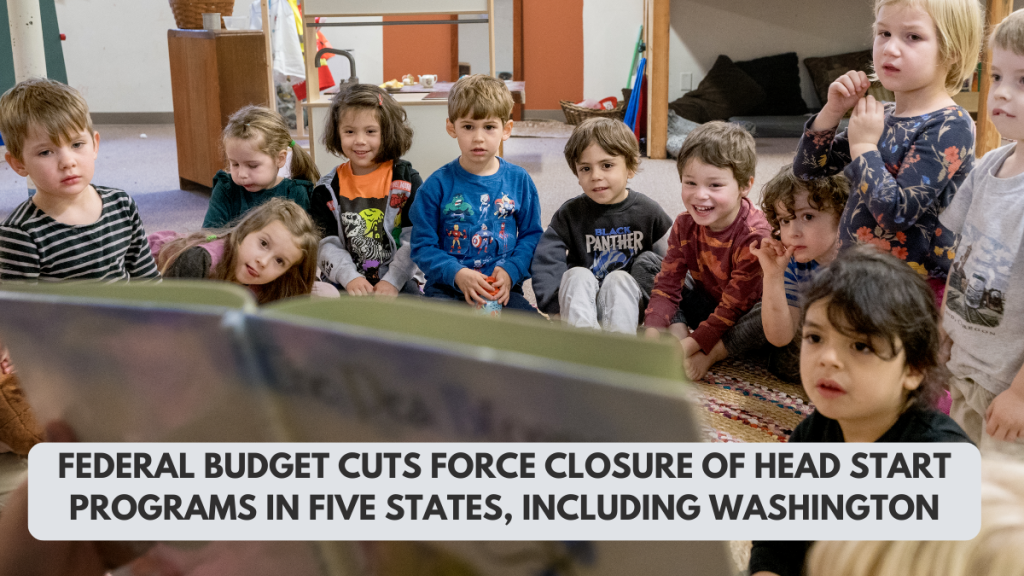
A wave of federal budget cuts has led to the sudden closure of several regional Head Start offices across the United States, with significant impacts already unfolding in five states—most notably in Washington. The U.S. Department of Health and Human Services (HHS), which oversees the Head Start program, has confirmed that these closures are part of broader restructuring efforts aimed at reducing federal spending.
Among the affected offices is the Region 10 Office in Seattle, which was responsible for overseeing Head Start operations in Washington, Oregon, Idaho, and Alaska. The closure has sparked serious concerns about the continuity of early childhood education services for thousands of low-income families.
Abrupt Office Closures Leave Programs in Limbo
On March 28, 2025, employees at the Seattle office were unexpectedly locked out of their workplace. All six staff members were placed on administrative leave and later notified that their positions had been terminated. The closures came without prior consultation with state or local program administrators.
According to The Spokesman-Review, the Seattle office’s shutdown is one of several across the country. Offices in Boston, New York, Chicago, and San Francisco were also affected. These regional offices served as vital support centers for Head Start programs, distributing funds, providing technical assistance, and ensuring compliance with federal regulations.
With the closure of these administrative hubs, local Head Start grantees now face delays and uncertainty in renewing contracts and receiving essential guidance. One-third of more than 70 grant recipients in the former Region 10 area are up for renewal by July 1, 2025, raising fears that the lack of oversight could disrupt services.
Advocates Sound the Alarm

The National Head Start Association (NHSA) has expressed serious concern over the federal decision to shut down the offices without a transitional plan. In a recent statement, the NHSA emphasized the critical role these regional teams played in supporting Head Start’s mission to serve the nation’s most vulnerable children.
“We are deeply alarmed that such a vital component of our system has been dismantled without explanation or replacement,” said NHSA Executive Director Yasmina Vinci. “This action undermines the infrastructure we rely on to deliver high-quality early childhood education.”
Local Head Start providers, particularly those with upcoming grant renewals, worry that the absence of regional oversight will lead to funding delays, program suspensions, and loss of services for children and families in need.
What is Head Start?
The Head Start program, established in 1965, provides comprehensive early childhood education, health, nutrition, and parent involvement services to low-income children and families. Administered by the Office of Head Start under the Administration for Children and Families (ACF), the program serves over 1 million children nationwide.
Head Start grantees—typically school districts, non-profits, and tribal governments—depend on federal funding and regional support to maintain their operations. The now-defunct regional offices were responsible for helping these grantees comply with program standards, apply for grants, and improve service quality.
More information on the Head Start program and how it operates can be found on the ACF’s official website.
Fallout in Washington and Beyond
In Washington state, the fallout from the Seattle office’s closure is already being felt. Without local federal staff to guide the process, some programs are unsure how to navigate the grant renewal procedures. Others fear that administrative backlogs could lead to a temporary loss of funding or even permanent program shutdowns.
“We have dozens of staff, hundreds of kids, and we’re in limbo,” said one Head Start director from Spokane. “Without support, we don’t know how to meet the renewal deadlines or what the expectations are.”
Programs in Alaska and rural parts of Oregon and Idaho are especially vulnerable, given their geographic isolation and reliance on the Seattle office’s expertise.
Federal Response and Unanswered Questions

As of now, the U.S. Department of Health and Human Services has not issued a public statement detailing the rationale for the closures or outlining alternative plans for supporting Head Start programs. HHS has also not clarified whether national staff will assume the responsibilities previously held by regional personnel.
Inquiries from lawmakers and advocacy organizations continue to mount. Many are calling on Congress to investigate the sudden nature of the terminations and to demand that HHS provide a strategy for ensuring continued support for local programs.
Senator Patty Murray (D-WA), a longtime supporter of Head Start, has indicated that she is seeking answers from HHS officials.
“This decision threatens the well-being of thousands of families in our state,” Murray said. “We need accountability and a plan to fix this.”
What Happens Next?
For now, Head Start grantees are left to navigate a complex and uncertain landscape. Some are turning to state education departments for guidance, while others are seeking legal advice to ensure compliance with federal grant requirements.
Advocates warn that without immediate federal intervention and a well-structured transition plan, children and families served by Head Start could bear the brunt of the disruption.
For updates and resources, program administrators and families are encouraged to visit the Office of Head Start’s official site or contact the ACF Regional Administrator for their area.
If your local Head Start program is affected, or you have questions about funding or enrollment, you can reach out to the Head Start program locator at eclkc.ohs.acf.hhs.gov.



